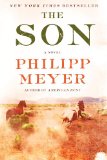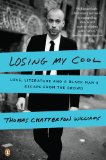Summary | Excerpt | Reviews | Beyond the book | Read-Alikes | Genres & Themes | Author Bio

From the book jacket:
In this exquisitely rendered memoir set on the high plains of Texas, Pulitzer Prize winner Gail
Caldwell transforms into art what it is like to come of age in a particular time
and place. A Strong West Wind begins in the 1950s in the wilds of the
Texas Panhandle – a place of both boredom and beauty, its flat horizons broken
only by oil derricks, grain elevators, and church steeples. Its story belongs to
a girl who grew up surrounded by dust storms and cattle ranches and summer
lightning, who took refuge from the vastness of the land and the ever-present
wind by retreating into books. What she found there, from renegade women to men
who lit out for the territory, turned out to offer a blueprint for her own
future. Caldwell would grow up to become a writer, but first she would have to
fall in love with a man who was every mother's nightmare, live through the
anguish and fire of the Vietnam years, and defy the father she adored, who had
served as a master sergeant in the Second World War.
A Strong West Wind is a memoir of culture and history - of fathers and
daughters, of two world wars and the passionate rebellions of the sixties. But
it is also about the mythology of place and the evolution of a sensibility:
about how literature can shape and even anticipate a life.
Comment: Pulitzer Prize-winner Caldwell's memoir opens with her upbringing in 1950s and
'60s Amarillo, in the heart of the Texas Bible Belt, where she was raised in a
close-knit family by patriotic conservative parents. She grew up into a
fast changing world marked by rock-and-roll, women's lib, free-love and war.
Her memories are laced with nostalgia for the Texas she knew and loved, and the
people, especially her parents, who's grit and determination, personified the
State for her. However, from her early teens, she knew she needed to break
away.
Inspired by Thomas Wolfe's first novel Look Homeward, Angel (1929)* she
left home to find her destiny, having had an inkling of what that might be during
a summer internship with the local newspaper, where she discovered "a work world
where eccentrics reigned." In the context, it is apt that she
has taken the title of her book from Exodus 1:19: And the Lord changed the
wind to a very strong west wind, which caught up the locusts and carried them
into the Red Sea.
Her writing style is strong, but occasionally slips a little too far into
rhetoric which (to quote Publishers Weekly) "is not deep enough to sink a ship
[but] is sufficient to leave the author floating too often in 'poetic'
abstraction when she should be grounded in prose that is both penetrating and
precise." Despite this minor criticism both PW and Booklist give her
starred reviews and all agree that this is a thoughtfully written tale that ably
explores how we become the people we are through the lens of one woman's life.
*Thomas Clayton Wolfe (1990-1938) is considered one of America's most important 20th century novelist. He died at the age of 38 of tuberculosis on the brain.
![]() This review was originally published in The BookBrowse Review in February 2006, and has been updated for the
February 2007 edition.
Click here to go to this issue.
This review was originally published in The BookBrowse Review in February 2006, and has been updated for the
February 2007 edition.
Click here to go to this issue.

If you liked A Strong West Wind, try these:

by Philipp Meyer
Published 2014
Part epic of Texas, part classic coming-of-age story, part unflinching portrait of the bloody price of power, The Son is an utterly transporting novel that maps the legacy of violence in the American West.

by Thomas Chatterton Williams
Published 2011
A pitch-perfect account of how hip-hop culture drew in the author and how his father drew him out again - with love, perseverance, and fifteen thousand books.
Your guide toexceptional books
BookBrowse seeks out and recommends the best in contemporary fiction and nonfiction—books that not only engage and entertain but also deepen our understanding of ourselves and the world around us.